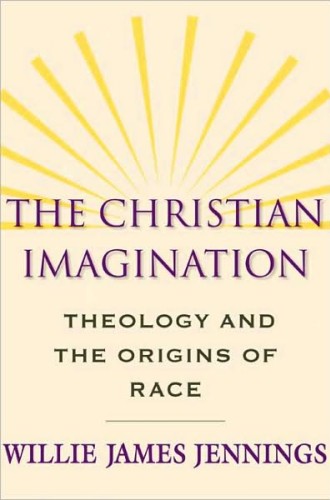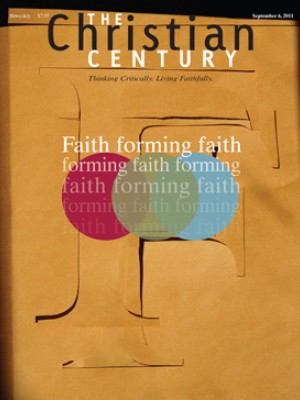The Christian Imagination, by Willie James Jennings
In modern imperialism, race, colonization and Christianity have historically been so intrinsically embedded with one another that the connections between them have seemed natural, and Christian theologians have participated in the geographical and geopolitical construction of this imperialism. Willie James Jennings's book is a genealogy of their participation.
Jennings begins by telling of experiences in which he, his parents and his community were objects of evangelism and missions. His parents, migrants from the Deep South, had settled in Grand Rapids, Michigan, the mecca of Reformed Christianity. Stories and storytelling were determinant aspects of his upbringing, and his parents were devout believers; Jesus and biblical faith were ever-present realities. Jennings remembers that one day white missionaries from the Christian Reformed Church in the neighborhood invited themselves into his mother's garden to inquire into her faith, talk about their church and inform her about the programs available for children. He remembers that they addressed him as if he were five years old, when he was actually 12.
Read our latest issue or browse back issues.
The visitors were unaware that his parents were well planted in their community, were pillars of their church and had been living in the neighborhood for years. Jennings, his parents and his neighborhood were suddenly objects of missions. In that garden meeting, what came together were two Christianities, one black and one white. Jennings ponders: "Why did these men not know me, . . . not know the multitude of other black Christians who filled the neighborhood that surrounded that church?"
Years later, Jennings was a student at Calvin College, a Christian Reformed institution, and was delivering his first sermon at chapel. His theology professors shook his hand afterward in gratitude for the word he had preached. Jennings remembers that this moment contrasted with the first. He experienced "a sense of connection and belonging and of a freedom to claim, to embrace, to make familiar one who is not." In this moment he imagined Christian intimacy as a genuine possibility. The two moments frame Jennings's book, which traces Christian imaginations of faith and race through displacement, translation and intimacy.
Part one, titled "Displacement," narrates Portuguese trafficking in sub-Saharan African slaves and the Spanish conquest of Peru. In the first story, the chronicler of Prince Henry of Portugal interprets the prince's need to legitimize control over black flesh and to provide a Christian theological framing of this power. In a theology of creation and providence, the chronicler articulates the suffering of the captives in a penitential prayer that imagines Christian faith in creation and divine providence; this eases his conscience while justifying Portugal's power over black flesh.
In a parallel narrative of a Jesuit in Peru, Jennings expands the chronicler's theodicy problem by considering it in relation to the displacement of Peruvian peoples. Like Prince Henry's chronicler, the Jesuit provides a theological answer within the pedagogy of creation and providence. It is not an easy task, for the church's teachings on natural history fail against New World realities. The Jesuit's consequent history reproduces creation, providence and race within "pedagogical imperialism." Both accounts produce Christian imaginings of theology and race that distort Christian intimacy. They imagine not only a new creation but also a new origin of race.
In part two, called "Translation," Jennings starts by narrating the British missions to the Zulus of South Africa. He highlights how translation of the Bible into Zulu vernacular both converted and educated indigenous peoples whose traditional world was collapsing in the wake of European conquest, the confiscation of Zulu lands and the Europeans' strategies of racial containment. Literacy alienated Christian Africans from their peoples and traditions, containing them through Western domesticity while they were denied equality with other Christians.
Jennings next narrates the creation of the "African." He draws on the Interesting Narrative of Olaudah Equiano, an abolitionist and former slave. Equiano's words of faith, hope, assimilation and racial equality through Christian civilization required, Jennings writes, a "Christian vision that lacks the ability to imagine multitude, different peoples joined together in love, and thus lacks the desire to reconstitute its life through the many."
Part three is titled "Intimacy." In it, Jennings discusses the significance that literacy holds in the production of segregated mentalities and segregated Christianities. Vernacular translations of the Bible led easily to Protestant national supersessionism. Literacy was the key to national articulation of white space and was instrumental in containing black imaginaries. If Christians are to overcome mangled, segregated mentalities, says Jennings, they must have a new imagining of right relations: a "deep joining, the opening of lives to one another in love and desire."
In a constructive theological move, Jennings asks readers to build a Christian vision of connectedness with biblical Israel as an answer to Christian supersessionism. By redeeming biblical history and hence biblical theology, he writes,
the people of God reach down to join the land and reach out to join those around them, their near and distant neighbors. This joining involves first a radical remembering of the place, a discerning of the histories and stories of those for whom that land was the facilitator of their identity. This must be done to gather the fragments of identity that remain to learn from them (or at least from their memory) who we might become in that place.
For Jennings, Israel's biblical faith and hope points toward a Jewish Jesus who imagined a kingdom of joinings, rooted in real places, real lived experiences and God's incarnational love between Jews and gentiles. He proposes this Christian alternative to the supersession of empires and nations, classes and estates, races and ethnicities, and whites and blacks.
Jennings's book deconstructs a complex history of contact and conquest that made possible the segregated Christianities he experienced in his mother's garden and the false intimacy he experienced as a student at Calvin College. I have great sympathy with his critiques of Christian supersession, especially in the case of white hegemony over black flesh. However, I find a certain irony in his endorsement of biblical Israel as a key to overcoming supersessionism. What are Christians to make of the new covenant? To identify with biblical Israel's story is to commit one's Christian imaginings to a story of displacement, translation and othering from within salvation history itself.
As a tale of contact, conquest and decline, biblical Israel's history points to a Jewish Jesus who invites all into intimacy with God and levels the wall that divides Jews and gentiles. This is recognizably gospel. Whether Jennings can have gospel without supersession has yet to be imagined. Nevertheless, his imagining of intimacy, joining and right relations without supersession is powerfully narrated in his theological history.







